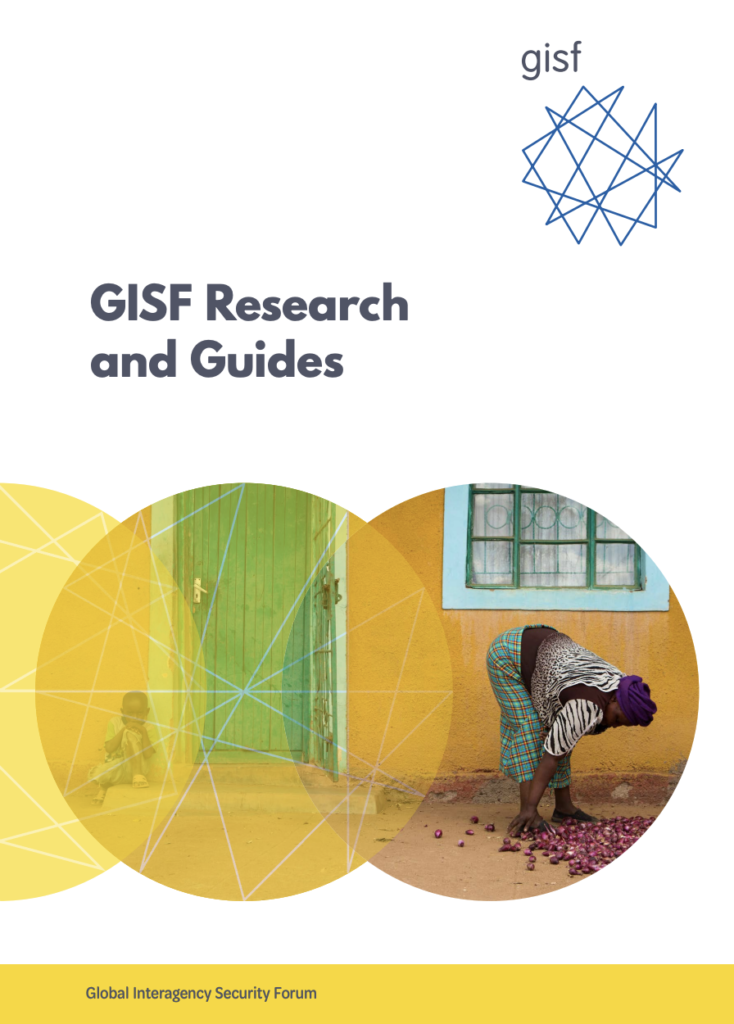GISF Publications
GISF Briefing Papers and Reports
GISF Briefing Papers and Reports investigate some of the key conceptual issues facing NGOs and security risk managers in humanitarian operations. The papers aim to consolidate theory in practice; many contain practical tools through which the evidence researched can be applied.
Written by sector experts, the GISF Secretariat and GISF members, GISF research is conducted using participatory action research methods. This fosters a collective approach by the humanitarian community for the humanitarian community, to reflect on the ways in which security risk management issues are addressed.
As a member-led forum, research topics are identified by members and developed by experts and the Secretariat using member input through consultations and working groups.
GISF Guide Series
GISF good practice guides are intended as tools for both managers and practitioners. They provide easy-to-follow checklists and adaptable procedural frameworks through which security managers can draw conclusions, apply their own experience and make decisions regarding security risk management for their own organisations and their specific operating contexts.
The contents of the documents are purposefully generic; they should be adapted to an agency’s needs and circumstances and may be used as a checklist. Guides also contain useful editable tools, which can be downloaded from the GISF website. Guides are authored by sector experts with the input of the GISF Secretariat. GISF members and external contributors review and input into the guides’ content via working groups.
About the Global Interagency Security Forum (GISF)
GISF is a peer-to-peer network of security focal points who represent over 100 humanitarian organisations operating internationally. It is committed to improving the safety and security of operations and staff by strengthening humanitarian security risk management (SRM). As an NGO-led forum, GISF harnesses the collective knowledge of its members to drive change in the humanitarian SRM sector through original research, events and more.
For GISF, humanitarian refers to not-for-profit activities that seek to improve lives and reduce suffering. GISF facilitates exchange between member organisations and other bodies such as the UN, institutional donors, academic and research institutions, the private sector and a broad range of international NGOs.
GISF strives to improve practice by producing original research and practical guides that fill knowledge gaps across the sector. The forum invests in capacity building by promoting learning through training and events, an online resource hub, and a renowned research programme.
GISF Resource Hub
At GISF, all of our activities are grounded in the practicalities faced by members when implementing programmes across the globe. The pool of experience and knowledge represented in our network makes us the go-to place for humanitarian SRM expertise.
The GISF website provides a virtual learning hub for security-minded organisations. As well as housing our catalogue of original publications, the vast collection of NGO focused resources available in our e-library promotes continuous improvement in humanitarian SRM, including:
- easy-to-use tools and training materials;
- useful links; topical blogs and briefings;
- upcoming events and conferences;
- training courses, and;
- vacancies and consultancies in humanitarian SRM.
GISF members can also access our tailored members’ area and online chat, providing ample opportunities for direct peer-to-peer support. In addition to membership, we offer engagement routes for a broad range of stakeholders – from our non-profit members to our strategic business partners. If you’d like to join the GISF network, get in touch or find out more.
